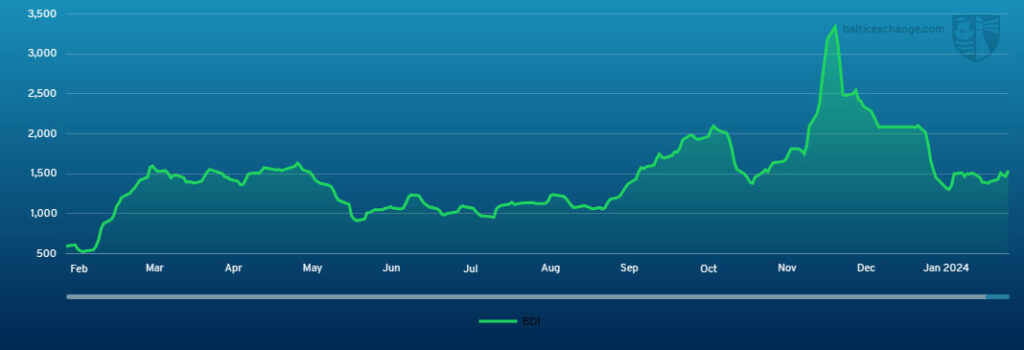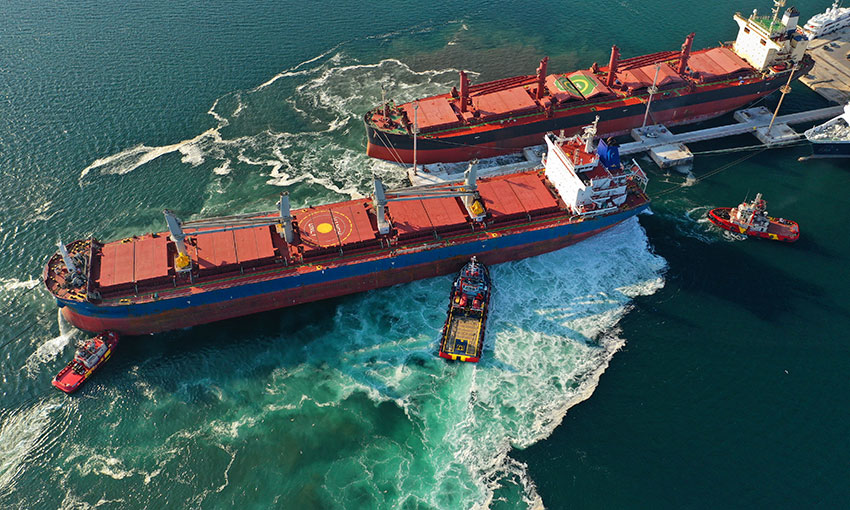THE BALTIC Dry Index ended last week at 1545 – an increase of 10% since the previous Friday.

Capesize
The capesize market started the week with a cautiously optimistic tone despite sluggish overall activity. Weather disruptions in China and a gradual start in the Atlantic were notable factors. By midweek there was a significant boost to market sentiment, with the BCI 5TC seeing a substantial increase, driven by active engagement from all three miners in the Pacific and robust cargo lists. Further in some owners secured cover ahead of the Chinese New Year holidays, leading to a decline in C5 rates.
As the week draws to a close there was a mixed picture, with the Pacific market experiencing pressure on rates initially, followed by a correction, while activity remained robust from South Brazil and West Africa, tightening the market slightly, specifically for end February/early March loaders from South Brazil and West Africa. Overall, the week was influenced by Lunar New Year holiday preparations and regional demand dynamics.
Panamax
A captivating week for the Panamax market with various peaks and troughs seen across the market. Despite a muted start the Atlantic sprung into life, however very mixed views on where true market value was on some of the routes. Primarily good grain fronthaul demand was said to be lending support on trans-Atlantic rates as demand ate into the tonnage count.
EC South America returned an active week, the deferred dates for March appeared firmer priced in comparison to the end February arrivals with several deals fixed around the US$17,000 + US$700,000 mark delivery Aps load port.
Asia returned a mixed week too as we head into Lunar New Year holidays. The Nopac rounds were seen concluding around the US$10,500 mark for 82,000-dwt types whilst LME tonnage regularly achieved US$10,000 levels for trips via Indonesia to China. Period activity remained prevalent too, with US$17,000 concluded on a new build 82,000-dwt delivery ex yard China basis one year.
Ultramax/Supramax
Another rather positional week overall for the sector, with the Year of the Dragon approaching levels of fresh enquiry in Asia were limited certainly in the Southeast. From the Atlantic, a limited supply of fresh tonnage in the US Gulf saw rates push up, whilst the South Atlantic was described as finely balanced although there were some stronger numbers seen for fronthaul business.
Period cover was actively short, a 63,500-dwt open US Gulf fixing 12 months trading with redelivery Singapore-Japan at US$19,500 and another 63,500-dwt open India fixed similar duration redelivery worldwide at US$17,000. From the Atlantic, an ultramax was fixed from New Orleans to Singapore-Japan at US$31,000. Further south, a 63,000-dwt fixed delivery Santos redelivery SE Asia at US$18,000 plus US$800,000 ballast bonus. In Asia limited action although a 63,000-dwt open CJK fixed a NoPac round at US$12,000. Stronger numbers were seen again from the Indian Ocean. A 63,000-dwt fixed delivery Port Elizabeth for mid-February to the Far East at US$25,000 plus US$250,000 ballast bonus.
Handysize
General negativity continued across the handy sector, on the Continent, premiums remained for specialist vessels with a 38,000-dwt log-fitted vessel fixing basis passing Skaw via Riga to Baltimore with a cargo of sawn lumber at US$14,750 whilst a standard 38,000-dwt fixed from Hamburg to EC South America in the low US$10,000’s with a cargo of fertilizer. Limited cargo availability was still an issue for prompt vessels in the US Gulf with a 32,000-dwt fixing from SW Pass to Ireland with grains at US$9,000.
The South Atlantic showed some resistance for later dates, however prompt vessels remained under pressure with a 34,000-dwt fixing from Santos to Morocco with sugar at US$14,000. Asia remained generally quiet but levels were said to have remained steady with a delicate tonnage to cargo balance this week, a 37,000-dwt opening in China fixed via Western Australia to the Far East at US$7,000 whilst a 30,000-dwt fixed from Singapore via Kajang to China with Alumina at US$6,500.
Clean
LR2
LR’s in the MEG continued their downward trajectory this week. The 75kt MEG/Japan TC1 index shed 51.66 points to WS261.67. The 90kt MEG/UK-Continent TC20 run to the UK-Continent dropped consistently through the week from US$8.263 million to US$7.006 million
West of Suez, Mediterranean/East LR2’s on held stable all week seeing the TC15 index stay around the US$5.8 million – US$6 million mark.
LR1
In the MEG, LR1 freight also lost around 15% of its value mirroring their larger siblings. The 55kt MEG/Japan index of TC5 is currently pegged at WS295.63, down 53.75 points. The 65kt MEG/UK-Continent of TC8 dropped from US$7.121 million to US$5.857 million.
On the UK-Continent, the 60kt ARA/West Africa TC16 index, after peaking at W245 end of last week has ticked back down to WS237.56 with the market appearing quieter over the last few days.
MR
MR’s in the MEG have been under pressure for the second week in a row, the TC17 index lost 30.71 points to WS394.29.
UK-Continent MR’s have optimistically resurged this week. Following a widely reported fixture at the end of the week WS180 the 37kt ARA/US-Atlantic coast of TC2 index is currently marked at WS186.72 up from WS150.28. On a TC19 run (37kt ARA/West Africa) the index has followed TC2, coming up from WS168.19 to WS207.19.
The USG MR freight crept up this week off the back of available tonnage thinning out. TC14 (38kt US-Gulf/UK-Continent) went from WS163.93 to WS170.36. The 38kt US Gulf/Brazil on TC18 also hopped up 18.57 points to WS233.57. The 38kt US-Gulf/Caribbean TC21 climbed US$22,599 to US$682,857 taking the Baltic TCE for the run back over the £20,000 / day round trip level.
Handymax
In the Mediterranean, Handymax’s increased activity, bolstered by a busy MR market in the region boosted the TC6 index from WS245 to WS270.06
Up in North West Europe, the TC23 30kt Cross UK-Continent index held flat at WS205 all week.
VLCC
The market was firmer this week with gains across all regions in the VLCC sector. The rate for the 270,000 mt Middle East Gulf to China route climbed almost eight points to WS65.91 which corresponds to a daily round-trip TCE of about US$42,806 basis the Baltic Exchange’s vessel description.
In the Atlantic market, the 260,000 mt West Africa/China rose seven points at WS66.858 which shows a round voyage TCE of US$44,338 per day while the rate for 270,000 mt US Gulf/China recovered US$127,777 to US$8,894,444 (providing a round-trip daily TCE of US$43,819), and there is an overnight report of Equinor on subjects with a VLCC with lay days around 10th March, 270,000 mt USG/East at US$9,250,000 so perhaps this market has further potential.
Suezmax
Suezmaxes in West Africa were again slightly weaker this week with the rate for 130,000 mt Nigeria/UK Continent two points lower than last Friday at WS103.27 (a daily round-trip TCE of US$38,673). In the Mediterranean and Black Sea region the rate for 135,000 mt CPC/Med slipped two points to WS127.30 (showing a daily TCE of US$52,208 round-trip). In the Middle East, the rate for 140,000 mt Middle East Gulf to the Mediterranean was six points lower at WS117.67.
Aframax
In the North Sea, the rate for the 80,000 mt Cross-UK Continent route fell 13 points to WS155.71 (showing a round-trip daily TCE of US$51,212 basis Hound Point to Wilhelmshaven).
In the Mediterranean market the rate for 80,000 mt Cross-Mediterranean tumbled 30 points to WS161.61 (basis Ceyhan to Lavera, that shows a daily round trip TCE of US$44,123).
Across the Atlantic, the Stateside market fell again on the short-haul voyages. The rate for 70,000 mt East Coast Mexico/US Gulf (TD26) eased three points to WS206.88 (a daily TCE of US$57,066 round trip) and the rate for 70,000 mt Covenas/US Gulf (TD9) lost six points to WS195.94 (a round-trip TCE of US$46,958 per day). The rate for the trans-Atlantic route of 70,000 mt US Gulf/UK Continent (TD25) bucked the trend and rose five points to WS191.88 (a round trip TCE basis Houston/Rotterdam of US$46,338 per day).
LNG
Action has picked up in the LNG market, with several cargoes and tenders coming into play from the Atlantic, ships being taken on subs or in firm discussions has done something to hush the negative rhetoric that has been surrounding the LNG spot market since the beginning of the year. Rates for the 174cbm ship were flat with BLNG1 Aus-Japan gaining a small amount to finish up at US$56,051, while BLNG2 US-Cont finished US$53,135 and the biggest mover of the week BLNG3 US-Japan gained US$4126 to finish at US$53,270. The 160cbm vessel moved less overall compared to the larger ship and except for BLNG2 was positive overall. BLNG1 on the 160cbm finished US$37,097, while US-Cont BLNG2 fell by US$138 to a close of US$38,980. BLNG3g on the 160cbm finished very flat at US$39,561 but the consensus from brokers is that the back of the worst of it has now been broken.
Period has picked up steam, in discussions if not in rates, while both one-year and three-year terms were unchanged at US$74,067 and US$88,000 respectively the six-month charter discussions were optimistic, rates rising only US$100 but to a close of US$52,800 which hints at more action in the summer to come.
LPG
It is a nice change to be able to change the tone of the LPG market report this week, finally with greater interest with cargoes working firm several ships have been fixed away and rates reacted positively. For the BLPG1 Ras Tanura-Chiba a rise of US$17.143 from year lows means we published at US$48.714, an increase of over US$16,000 TCE earnings to a daily equivalent of US$27,393.
The improvement of the ARB has helped bolster the US market and across the Atlantic BLPG2 Houston-Flushing gained a modest US$9.6 to finish with a published value of US$47 while TCE earnings went up to a close of US$38,382. The biggest improvement overall came from BLPG3 Houston-Chiba where a US$20.572 increase meant a final published value of US$92.286 this gives a TCE daily equivalent of US$31,269. One thing to note is that while the markets overall have risen quite well, they did so early on in the week, rates have begun to stagnate while many participants of the market are readying for the Lunar New Year, this could push rates down again but brokers are relatively optimistic about market stability for now.

